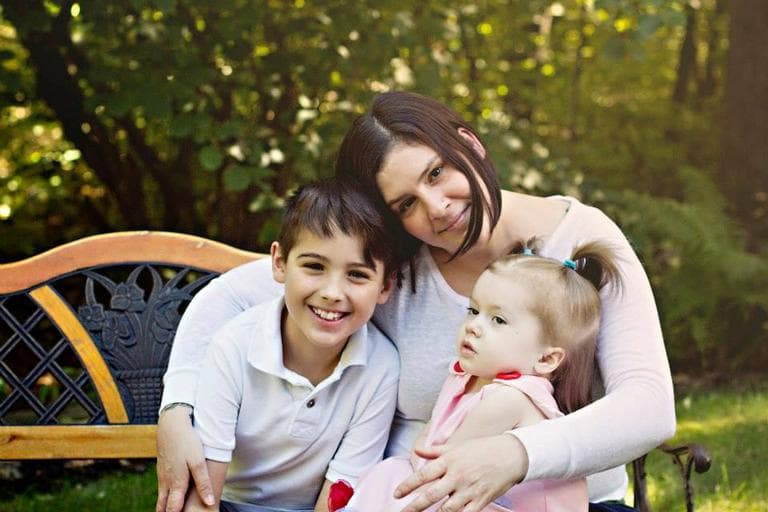Advertisement
Extreme Mothering: When A Child Has A Relentless Disease

In 2010, Kate, a single mom from Derry, New Hampshire, gave birth to Brook, a healthy baby girl.
Brook seemed to be developing normally and reaching all of her milestones — learning how to sit up and roll over, grasping at toys — until she was 6 months of age, at which point she started to regress. She lost skills she had already learned, and gradually Kate noticed other things. Brook didn't respond to her name, she would fixate on her hands and just stare and stare; she started dropping toys, unable to hold onto one in each hand at the same time. Eventually, after a long medical work up, Brook was diagnosed with Tay-Sachs disease in 2012, and Kate was told that her daughter would most likely not live past her third birthday.
Today, Brook, is two-and-a-half years old and requires constant care. She is blind. She cannot swallow and is fed through a feeding tube. She is having constant seizures. And she continues to deteriorate. Brook's older brother Jake, born to a different father and now 9 years old does not suffer from the disorder, but may be a carrier. This will remain unknown until genetic testing is done when he is a little older.
(Listen to the audio on the right to hear Kate's story of living with and caring for her terminally ill daughter.)
Tay-Sachs is a fatal genetic disorder. A child is born with Tay-Sachs when he or she inherits two damaged copies of the HEXA gene on chromosome 15 (one from each parent), which results in a deficiency of the Hexosaminidase A enzyme and the subsequent build up of a damaging fatty substance in brain cells. The result is a relentless, progressive loss of physical and mental functioning and eventually, death. A person with one damaged gene and one normal gene will become a carrier with no clinical symptoms of the disease. If two carriers have children together, there is a 25% chance of giving birth to an affected child with each pregnancy.
Tay-Sachs, a rare disease with an incidence of approximately 1 in 320,000 in the general population, occurs with increased frequency in certain populations, including Ashkenazi Jews, French Canadians, and Cajuns (from Louisiana). In these groups, approximately 1 in 30 individuals is a carrier, and 1 in 3,500 children will be born with the disease.
Advertisement
Kate, who is of French Canadian descent, underwent no genetic testing and had no idea she was a carrier before Brook's diagnosis. She knew nothing about Tay Sachs, and was unaware that French Canadians are at increased risk.
How does a mother manage life when her child is dying? She mothers. Kate spends most of every day in her living room with Brook, an oxygen machine hissing in the background, surrounded by pill bottles, suctioning her daughter’s secretions, moistening her lips, and giving her medication to temper her seizures. Kate’s primary goal is to keep Brook as comfortable as possible in her last days, and she works very hard to achieve this. "So many people for so long would say, 'You're so amazing, I don't know how you do this; This is incredible, how do you manage this,'" Kate says. "I would look at them and think, 'This is my daughter, how can I not do this?'" And every day she tries to spend as much time as possible with her older son, Jake, and to support him through the impending loss of his sister the best she can.
This project was completed in collaboration with Blyth Lord, founder of the Courageous Parents Network, a non-profit whose mission it is to empower parents caring for children with life-limiting illness, and Bill Parker, founder of Hindsight Media.
Dr. Annie Brewster, author and audio producer, is a Boston internist and founder of Health Story Collaborative, a non-profit organization dedicated to harnessing the healing power of stories. You can hear and read more of her stories here, here and here, as part of our Listening To Patients series.
